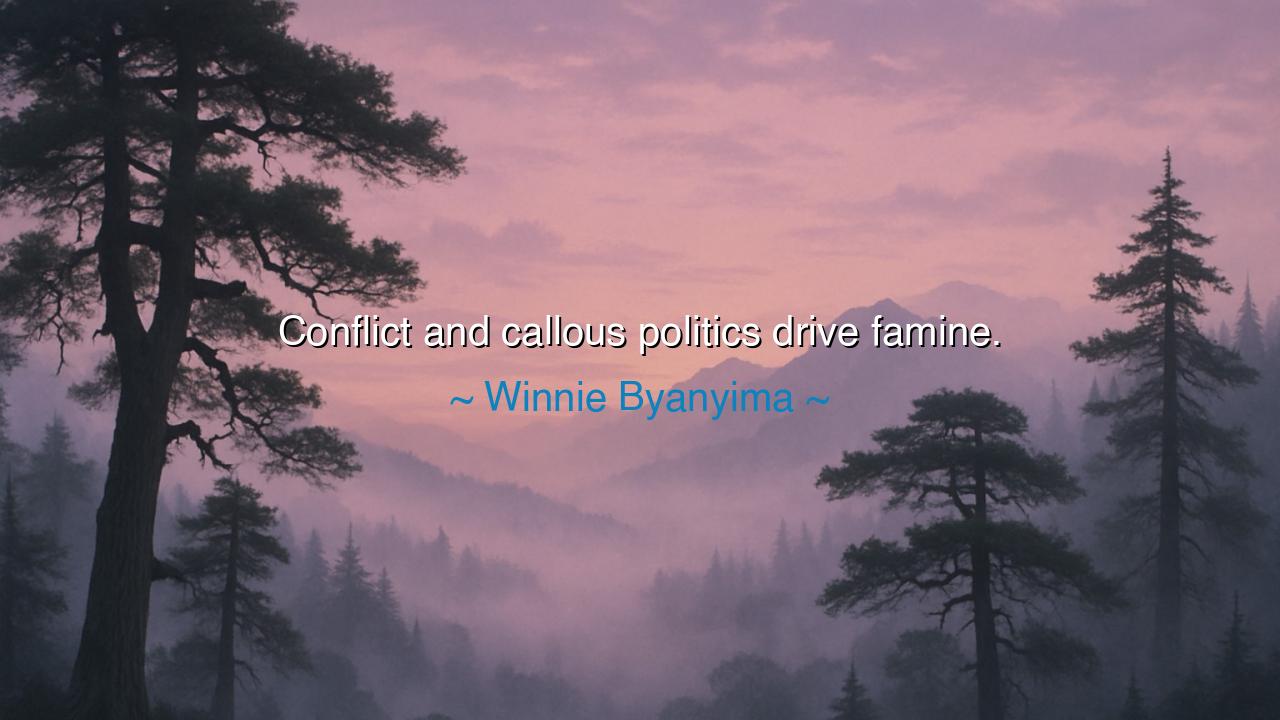
Conflict and callous politics drive famine.






The words of Winnie Byanyima — “Conflict and callous politics drive famine” — are not merely a cry of warning, but a lament carved into the memory of humankind. They tell us that hunger does not come solely from barren soil or failed rains, but far more often from the cruelty of men who wage war and rulers who harden their hearts. The earth can yield grain, the rivers can offer water, yet when human hands are turned to bloodshed, fields are abandoned, markets collapse, and the innocent starve.
From the days of the ancients, famine has rarely been a curse of nature alone. In Rome, during times of civil war, granaries stood full while soldiers guarded them, and the people suffered hunger. Likewise, in more recent centuries, the Irish Great Famine was worsened not only by blight but by the politics of empire, where relief was delayed, diverted, or denied. Thus Byanyima’s words remind us: politics without mercy becomes a weapon sharper than the sword.
A story from Ethiopia in the 1980s shows this truth vividly. Drought came, but it was the conflict between the government and rebels that sealed the people’s fate. Roads were blocked, aid was withheld, and entire villages were left to perish. Children wasted away not because the land could not recover, but because callous politics declared them expendable in the pursuit of power. Their cries echo still, carried on the winds as testimony to this grim teaching.
Yet even in tragedy, there is wisdom for the living. If conflict can strip food from the mouths of children, then peace can restore it. If callous politics can destroy, then compassionate leadership can save. Byanyima’s voice is both a warning and a summons: to remember that famine is man-made as often as it is natural, and thus men and women of courage can prevent it.
Let future generations know this truth: hunger is not destiny, but choice. Where rulers sow division, the harvest is famine; where they sow justice and mercy, the harvest is abundance. May these words be kept in the heart like an eternal flame, that those who hold power may wield it not to starve, but to sustain.






N7Dang Quang nghi 7k4
This statement really makes me wonder how much political corruption and power struggles affect the most vulnerable in society. It’s hard to imagine how those in power can justify policies that contribute to such immense suffering. Is the answer to this problem simply better leadership, or does it require a systemic change in how political institutions are structured? How do we move towards a system that values human life over political gain?
CBChau Bao
Byanyima’s quote paints a grim picture, but it’s all too true in many places where conflict devastates populations. How do we deal with the political leaders who turn a blind eye to the suffering caused by famine, especially when it’s driven by their own decisions? Can there ever be a shift in how politics and humanitarian needs are balanced, or will the two always be in conflict with each other?
HTHa Tran
It’s striking how Byanyima links famine directly to politics. We often think of famine as a natural disaster, but her statement puts it squarely on the shoulders of human decisions. What do you think needs to change in global politics to prevent such tragedies? Could international collaboration be the key to addressing root causes, or does each country's political agenda keep hindering meaningful progress on this issue?
BNpham bich ngoc
Byanyima's words are a stark reminder of the human cost of conflict and bad politics. It seems that the politics of indifference or corruption often make things worse, especially in regions already vulnerable to hunger. But, is the problem more systemic than political? Could it be that the structures of global aid and international relations often exacerbate famine? What needs to change in the way countries address these crises beyond politics?
TT39.Dao Thi Thu Trang
This quote made me think about how political decisions often prioritize strategic gains over the welfare of ordinary people. It’s sad to realize that some conflicts are driven by political motives that disregard human lives. Could global leaders do more to prevent famine by addressing the root causes—like conflict and political instability—before it escalates into a crisis? How do we ensure that humanitarian aid isn’t just a band-aid but a real solution?